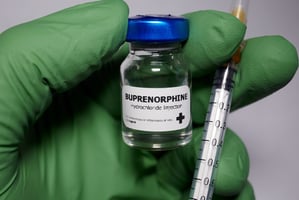Collaborative Care Model Designed for OUD Shows Promise in Primary Care

Individuals with opioid use disorder (OUD) treated in primary care with a collaborative care model (CoCM) focused on medications for OUD experienced a greater reduction in nonmedical use of opioids than those receiving collaborative care that only treats co-occurring mental health symptoms, according to a report in JAMA Psychiatry.
John C. Fortney, Ph.D., of the University of Washington, and colleagues noted that there have been two prior trials of collaborative care for alcohol and/or drug use, but none have focused on OUD exclusively. “Medications for OUD (MOUD) are highly effective, prevent overdose, and reduce mortality, yet fewer than a quarter of people with OUD receive MOUD,” the researchers wrote. “Offering MOUD in primary care could increase initiation of MOUD.”
The researchers enrolled 42 clinics in 15 health systems in the NIH-funded Collaborating to Heal Addiction and Mental Health in Primary Care (CHAMP) trial. Pairs of clinics within each health care system were randomized to provide either standard collaborative care, which integrates mental health care into a primary clinic via trained care managers and psychiatric consults, or a CoCM with additional support for OUD. In the latter, care managers encouraged MOUD adherence and were trained to deliver a manualized eight-to-12-session behavioral activation tailored for patients with co-occurring OUD and mental health symptoms. If the patient experienced opioid-related withdrawal symptoms, craving, or reported nonmedical opioid use, the psychiatric consultant could recommend changes to the OUD treatment plan.
A total of 254 patients participated in the trial. Participants completed research assessments at baseline, three months, and six months. The primary outcomes were past-month number of days of using opioids and mental health-related quality of life as measured with the Veterans RAND 12 Mental Health Component Summary (MCS).
At three months, patients receiving the OUD-focused CoCM had an average of 1.44 days using opioids compared with 3.98 days among those receiving standard CoCM; at six months, patients in the intervention group had 0.72 days using opioids compared with 3.92 days in the control group. Scores on the MCS improved in both groups, but there was no statistical difference.
Fortney and colleagues concluded: “These findings indicate that opioid use disorder can be effectively managed in primary care and that collaborative care that treats both opioid use disorder and mental health is a better treatment option than collaborative care that only treats mental health.”
For related information, see the Psychiatric News Special Report “Opioid Use Disorder—Treatment in an Ever-Changing Crisis.”
(Image: Getty Images/iStock/Ridofranz)
Don't miss out! To learn about newly posted articles in Psychiatric News, please sign up here.





